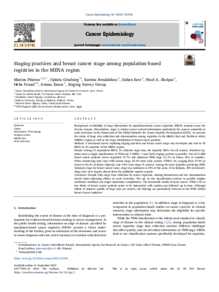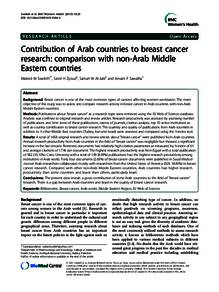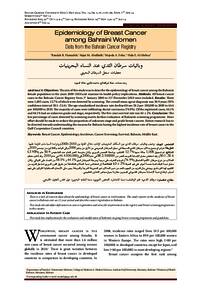Document
Staging practices and breast cancer stage among population-based registries in the MENA region.
Identifier
DOI: 10.1016/j.canep.2022.102250
Source
Cancer Epidemiology. v. 81, 102250
Contributors
Ginsburg, Ophira., Author
Bendahhou, Karima., Author
Eser, Sultan., Author
Shelpai, Wael A., Author
Fouad, Heba., Author
Znaor, Ariana., Author
Country
Netherlands.
City
Amsterdam
Publisher
Elsevier Ltd.
Gregorian
2022-12-01
Language
English
Subject
English abstract
Background: Availability of stage information by population-based cancer registries (PBCR) remains scarce for diverse reasons. Nevertheless, stage is critical cancer control information particularly for cancers amenable to early detection. In the framework of the Global Initiative for Cancer Registry Development (GICR), we present the status of stage data collection and dissemination among registries in the Middle East and Northern Africa (MENA) region as well as the stage distribution of breast cancer patients. Methods: A web-based survey exploring staging practices and breast cancer stage was developed and sent to 30 PBCR in 18 countries of the MENA region. Results: Among 23 respondent PBCR, 21 collected stage data, the majority (80%) for all cancers. Fourteen registries used a single classification (9 TNM and 5 SEER), 7 used both staging systems in parallel. Out of 12,888 breast cancer patients (seven registries) 27.7% had unknown TNM stage (11.1% in Oman, 46% in Annaba). When considering only cases with known stage, 65.3% were early cancers (TNM I+II), ranging from 57.9% in Oman to 83.3% in Batna (Algeria), and 9.9% were stage IV cancers. Among the nine registries providing SEER Summary stage for breast cancer cases, stage was unknown in 19% of the cases, (0 in Bahrain, 39% in Kuwait). Stage data were largely absent from the published registry reports. Conclusion: Despite wide stage data collection by cancer registries, missing information and low dissemination clearly limit informing efforts on early detection. The use of two classification systems in parallel implies additional workload and might undermine completeness. The favourable results of early cancer (TNM I+II) in two thirds of breast cancer patients needs to be interpreted with caution and followed up in time. Although efforts to improve quality of stage data are needed, our findings are particularly relevant to the WHO Global Breast Cancer Initiative.
ISSN
1877-7821
Resource URL
Category
Journal articles



